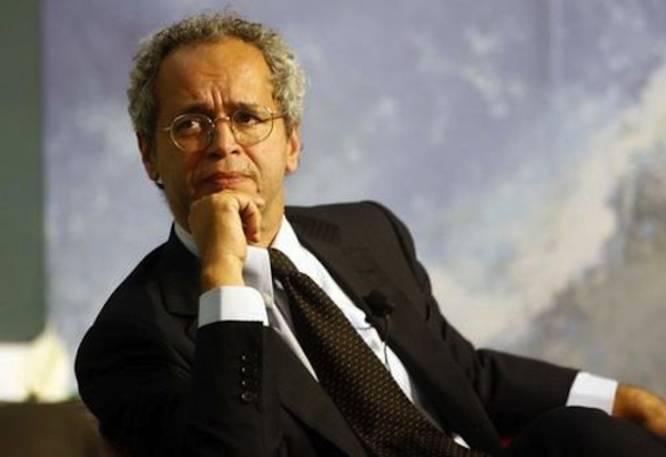


ROME –When Jean-François Julliard, general secretary of Reporters Sans Frontières, announced last October that Italy had sunk to the 49th slot down the list of countries holding high the banner of press freedom, many Italians were less than shocked. After all, in an obviously unresolved conflict of interests, the businessman who also happens to head the government, Silvio Berlusconi, still owns three national TV networks and wields some (though not total) control over the three state-owned networks. Frequent and long addresses to the nation via TV are therefore a norm.
Two key incidents showed what this control also means to the 70% of Italians who rely on TV for their news. First, Italian Premier Silvio Berlusconi stunned televiewers last November when he cavalierly phoned in, live, to a RAI [2] TV broadcast called Ballarò [3], headed by the dignified and fairly non-controversial Giovanni Floris, to protest the talk-show on the risks from toxic waste in the Vesuvius park area town of Terzigno. When Floris attempted to step in with a comment, Berlusconi snapped, “You have to stop interrupting me,” adding, “I know more about TV than you do.” Sergio Zavoli, the authoritative journalist who presides over the RAI oversight commission, said later that the phone call from Berlusconi was “an inappropriate use of an outside intervention on live RAI TV.”
Nevertheless, in January the director of RAI Channel One, Mauro Masi, emulated the Premier by breaking into a broadcast with a similar phone-in protest to Annozero [4], Michele Santoro’s controversial talk show.. The subject was the so-called “Rubygate,” about the relations between Berlusconi and a teenaged Moroccan girl, which Masi declared, on the air, was an improper use of state TV. Members of Berlusconi’s own Partito della Libertà later protested that the broadcast had been “the usual [attempt] to put Premier Berlusconi on trial” and called for Santoro to be investigated by a RAI oversight commission.
In yet another instance of tele-shut-up tactics, on Jan. 24 Berlusconi called a broadcast by Gad Lerner—again live during the show called L’Infedele [5]—with negative observations on the on-going discussion like “disgusting…false…distorted…repugnant..far from the truth.” Worst of all, he called the broadcast “a whorehouse.”
Not surprisingly, then, concerns over press freedom in Italy have grown. The ninth edition of the World Classification of Press Freedom issued by Reporters Sans Frontières showed Italy plunging a striking five notches below its rank of just two years before, to finish in a tie with Burkina Faso. Italy, moreover, placed below Bosnia, South Africa, Latvia and—get this—Romania. Only 13 of the 27 European Union members were listed high in the survey of respect for the freedom of the press, but all remaining EU members, including Italy, occupied the lower rungs.
Nevertheless, the important point is that, despite the pressures for Santoro’s program to be blocked, at this writing that show goes on. And despite the legitimate concerns, the authoritative TV anchor Enrico Mentana, for one, claims that, “Those saying there is no freedom of speech here are wrong. We have courageous broadcasters. And on the newsstands you can find every type of journal, with every point of view. We have absolute freedom of speech.”
Mentana is chief anchorman of La Sette, the lone alternative to the Berlusconi TV chain or the state channels. Curiously, he has worked for both before helping to found La Sette. In a session with a small number of journalists at the Foreign Press Association in Rome, Mentana reviewed his own relations with the two. In 1992, coincident with the Tangentopoli kickbacks scandal that resulted in the birth of the Second Republic, Mentana left his RAI slot for Berlusconi’s Mediaset [6], owners of his TV networks. “At the time I was told, ‘This is free TV, you can do anything you want—go ahead and show that you are freer and more able than RAI.’”
But times changed. Berlusconi entered politics, and in 2004 Mentana was forced to resign after 13 years. “I was sacked, I believe because I was a challenge to the system, first to RAI and then to Mediaset.” The immediate cause was his broadcast on the death of Eluana, a woman in a coma for 14 years, whose father decided to have artificial life support systems removed. Mentana sued Mediaset, and in May 2009, “I won—and also became famous.” The new 8 pm news broadcast was born, and today La Sette commands an audience of 2.5 million and continues to grow. “We decided to have only serious news, without the slush of infotainment. And above all to try to tell the truth—for instance, on RAI, if there are rude photos of the Premier, they will not be shown.”
Those interested can also see, disturbingly on the web from something called “Stormfront,” the headline: “Another Jew at La7 [7]: Enrico Mentana,” “son of a Jewish mother, therefore of the pure Jewish race.”
Stay tuned.
Source URL: http://ftp.iitaly.org/magazine/focus/op-eds/article/free-speech-in-italy-journalist-enrico-mentana-speaks-freely
Links
[1] http://ftp.iitaly.org/files/16968enrico-mentana-strana-espressione-nei-suoi-occhi1300897890jpg
[2] http://www.rai.it/
[3] http://www.ballaro.rai.it/
[4] http://www.annozero.rai.it
[5] http://www.la7.it/infedele/
[6] http://www.mediaset.it/
[7] http://www.la7.it/